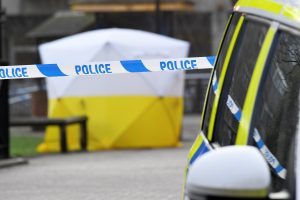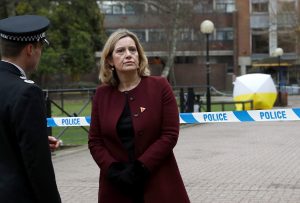
By Toby Melville and Emily G Roe
SALISBURY, England (Reuters) – Britain warned Russia on Tuesday of a robust response if the Kremlin was behind a mysterious illness that has struck down a former double agent convicted of betraying dozens of spies to British intelligence.
Foreign Secretary Boris Johnson named Sergei Skripal, once a colonel in Russia’s GRU military intelligence service, and his daughter Yulia as the two people who were found unconscious on Sunday on a bench outside a shopping center in southern England.
Skripal, 66, and his 33-year-old daughter were exposed to what police said was an unknown substance in the English city of Salisbury. Both are still critically ill in intensive care, police said.
“We don’t know exactly what has taken place in Salisbury, but if it’s as bad as it looks, it is another crime in the litany of crimes that we can lay at Russia’s door,” Johnson told the British parliament.
“It is clear that Russia, I’m afraid, is now in many respects a malign and disruptive force, and the UK is in the lead across the world in trying to counteract that activity.”
If Moscow was shown to be behind Skripal’s illness, Johnson said, it would be difficult to see how UK representation could go to the World Cup in Russia in a normal way. A government source said that meant attendance of ministers or dignitaries.
Russian Foreign Ministry spokeswoman Maria Zakharova said Johnson’s comments were “wild”.
A previous British inquiry said President Vladimir Putin probably approved the 2006 murder of ex-KGB agent Alexander Litvinenko with radioactive polonium-210 in London. The Kremlin has repeatedly denied any involvement in Litvinenko’s killing.
Litvinenko, 43, an outspoken critic of Putin who fled Russia for Britain six years before he was poisoned, died after drinking green tea laced with the rare and very potent radioactive isotope at London’s Millennium Hotel.
It took weeks for British doctors to discern the cause of Litvinenko’s illness.
His murder sent Britain’s ties with Russia to what was then a post-Cold War low. Relations suffered further from Russia’s annexation of Crimea and its military backing for Syrian President Bashar al-Assad against rebels trying to topple him.

A police car is parked next to crime scene tape, as a tent covers a park bench on which former Russian inteligence officer Sergei Skripal, and a woman were found unconscious after they had been exposed to an unknown substance, in Salisbury, Britain, March 6, 2018. REUTERS/Toby Melville
RUSSIAN DOUBLE AGENT
British authorities said there was no known risk to the public from the unidentified substance, but they sealed off the area where Skripal was found, which included a pizza restaurant and a pub, in the center of Salisbury.
Counter-terrorism police are now leading the investigation though they said they believe there no risk to the public. Samples from the scene are being tested at Porton Down, Britain’s military research laboratory, the BBC said.
Skripal, who passed the identity of dozens of spies to the MI6 foreign intelligence agency, was given refuge in Britain after being exchanged in 2010 for Russian spies caught in the West as part of a Cold War-style spy swap at Vienna airport.
The Kremlin said it was ready to cooperate if Britain asked it for help investigating the incident with Skripal.
Calling it a “tragic situation,” Putin’s spokesman Dmitry Peskov said the Kremlin had no information about the incident.
Asked to respond to British media speculation that Russia had poisoned Skripal, Peskov said: “It didn’t take them long.”
Russia’s embassy in London said the incident was being used to demonize Russia and that it was seriously concerned by British media reporting of the Skripal incident.
Russia’s foreign spy service, the SVR, said it had no comment to make. Russia’s foreign ministry and its counter-intelligence service, the Federal Security Service (FSB), did not immediately respond to questions submitted by Reuters about the case.
FROM MOSCOW TO SALISBURY
Skripal was arrested by the FSB in 2004 on suspicion of betraying dozens of Russian agents to British intelligence. He was sentenced to 13 years in prison in 2006 after a secret trial.
Skripal, who was shown wearing a track suit in a cage in court during the sentencing, had admitted betraying agents to MI6 in return for money, some of it paid into a Spanish bank account, Russian media said at the time.
But he was pardoned in 2010 by then-president Dmitry Medvedev as part of a swap to bring 10 Russian agents held in the United States back to Moscow.
The swap, one of the biggest since the Cold War ended in 1991, took place on the tarmac of Vienna airport where a Russian and a U.S. jet parked side by side before the agents were exchanged.
One of the Russian spies exchanged for Skripal was Anna Chapman. She was one of 10 who tried to blend into American society in an apparent bid to get close to power brokers and learn secrets. They were arrested by the FBI in 2010.
The returning spies were greeted as heroes in Moscow. Putin, himself a former KGB officer, sang patriotic songs with them.
Skripal, though, was cast as a traitor by Moscow. He is thought to have done serious damage to Russian spy networks in Britain and Europe.
The GRU spy service, created in 1918 under revolutionary leader Leon Trotsky, is controlled by the military general staff and reports directly to the president. It has spies spread across the world.
Since emerging from the John le Carre world of high espionage and betrayal, Skripal lived modestly in Salisbury and kept out of the spotlight until he was found unconscious on Sunday at 1615 GMT.
Wiltshire police said a small number of emergency services personnel were examined immediately after the incident and all but one had been released from hospital.
Skripal’s wife died shortly after her arrival in Britain from cancer, the Guardian newspaper reported. His son died on a recent visit to Russia.
A white and yellow police forensics tent covered the bench where Skripal was taken ill.
(Reporting by Toby Melville; Writing by Guy Faulconbridge; Additional reporting by Alistair Smout, William Schomberg, Andy Bruce and Michael Holden in LONDON, Andrew Osborn, Polina Nikolskaya and Margarita Popova in MOSCOW and Mark Hosenball in WASHINGTON; Editing by Matthew Mpoke Bigg and Gareth Jones)






